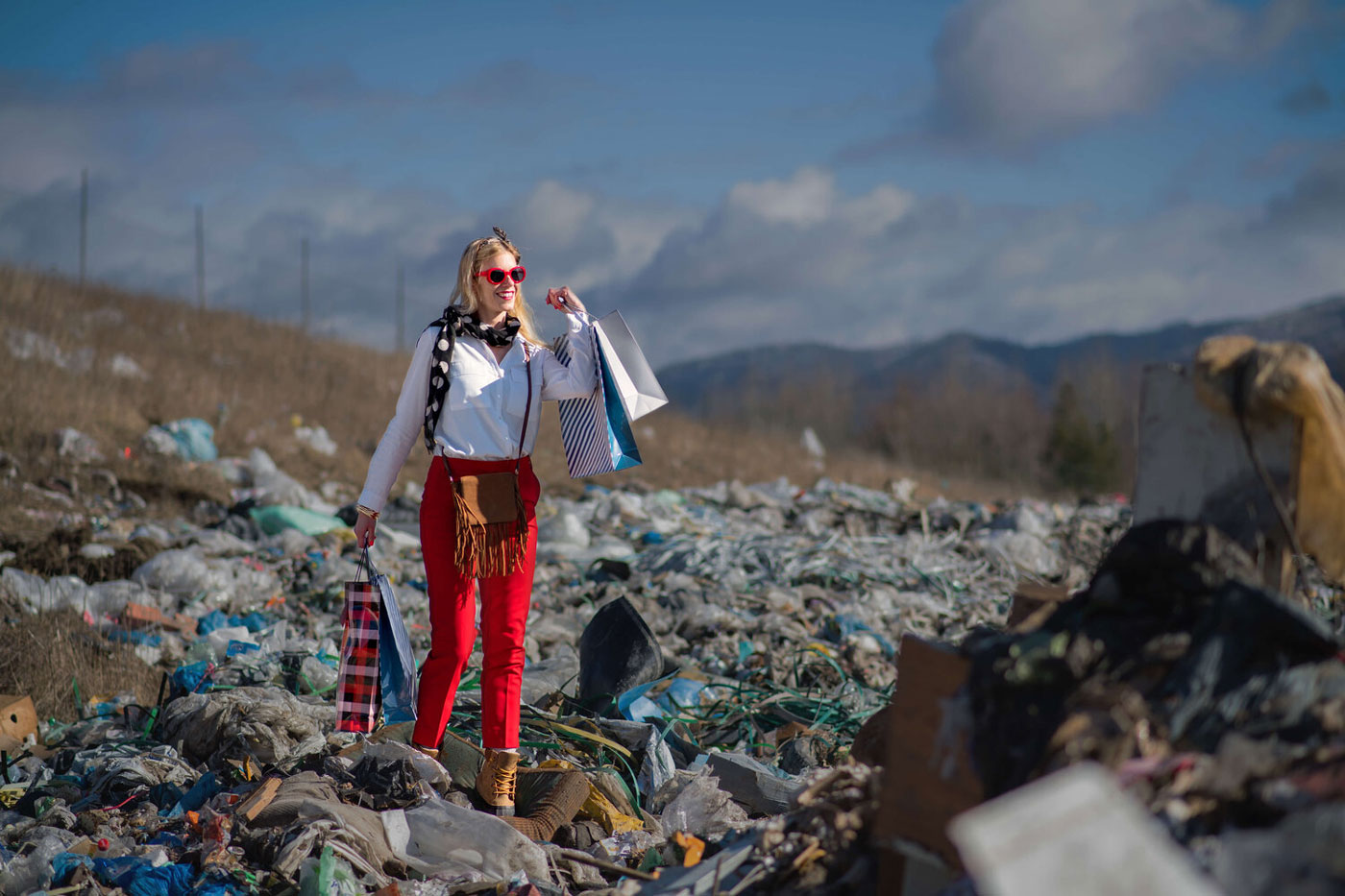As the sun sinks behind the horizon, casting a warm light on the busy city streets, I watch shoppers rush past, brandishing bags with the unmistakable Zara logo on their arms. Zara, the crown jewel of Spanish retail giant Inditex, has undeniably captured the hearts of fashionistas around the world. But behind the glittering façade of its triumph lies an untold narrative of imbalance – a silent battle waged by ethical, independent clothing labels struggling to survive in the wake of the inexorable march of fast fashion.
Wandering through the bustling shopping district, I can’t help but feel a sense of unease. The stark contrast between the vibrant energy around the Zara shop and the quiet, almost forgotten corners that are home to smaller, ethical brands is striking. These conscientious labels, committed to sustainable and fair practises, do their best to make a positive impact on the industry, but are often overshadowed by the relentless pace and temptations of the fast-fashion giants.
The repercussions of Zara’s meteoric rise to fashion dominance cannot be ignored. While the brand has revolutionised the industry with its lightning-fast production cycles and ever-changing collections, the environmental and social impact of its business model is deeply concerning. As a consumer and fashion enthusiast, I am torn between the undeniable appeal of Zara’s trendy offerings and the knowledge that supporting ethical, independent brands is crucial for a sustainable future. This leaves us with the question: what can we, as consumers, do to help level the playing field?
The Harsh Reality of Fast Fashion: Zara’s Environmental and Social Impact
Fast fashion has fundamentally altered the way we consume and perceive clothing. Brands like Zara have conditioned us to expect new, trendy items at breakneck speed and rock-bottom prices. However, the true cost of this approach is often ignored and takes a heavy toll on the environment and the people involved in the production process.
The fashion industry is the second largest polluter in the world, and fast fashion is a major contributor. A report by the Global Fashion Agenda and the Boston Consulting Group shows that the industry produces around 10% of the world’s greenhouse gas emissions and uses enormous amounts of water. Textile dyeing alone is the second largest water polluter in the world. The throwaway nature of fast fashion exacerbates the problem, as overproduction and rapid turnover result in an estimated 85% of textiles being thrown away each year, much of which ends up in landfills or is incinerated, according to the Ellen MacArthur Foundation.
Equally concerning are the social implications of fast fashion. The pressure to keep up with the latest trends and keep costs down often leads to the exploitation of garment workers, who are usually paid meager wages and forced to work in unsafe conditions. For example, the Rana Plaza factory collapse in 2013, which killed more than 1,100 people, highlighted the dangers associated with the industry’s relentless pursuit of cheaper and faster production.
Despite these problems, Zara and other fast fashion giants have found ways to avoid the consequences. They continue to thrive while smaller, ethical brands suffer, overshadowed by the lure of low prices and ever-changing trends. The playing field is still heavily tilted in favour of fast fashion, and it is time that we as consumers do something to even it out.
Zara’s Unsustainability: A Closer Look at Their Fast-Fashion Practices
Zara’s particular approach to fast fashion has led to several unsustainable practises that set it apart from its competitors. For instance, Zara uses a vertically integrated supply chain that allows the company to control every aspect of production and distribution, from design to retail. While this structure allows Zara to respond quickly to changing trends, it also fosters an environment of short-lived, throwaway fashion, which contributes to its negative impact on the environment.
In addition to its supply chain, Zara’s focus on producing large quantities of garments to meet consumer demand has led to a heavy reliance on cheap and environmentally harmful materials. For example, polyester, a petroleum-based fabric, is widely used by Zara and other fast fashion brands. The production of polyester not only consumes significant amounts of energy, but also produces harmful greenhouse gases and microplastics.
Moreover, Zara’s rapid expansion into new markets has seen the brand’s global footprint grow at an alarming rate. The company’s extensive shop network, which spans more than 96 countries, requires large amounts of resources to build, transport and operate, further exacerbating the brand’s environmental impact.
In summary, the Zara case is a clear example of the unsustainability of the fast-fashion model and shows how the pursuit of rapid growth and trend-driven production can only lead to significant environmental and social costs.
The True Cost of Zara’s Fast Fashion: Price Perception and Consumer Behavior
Understanding the true production cost of a garment is a complicated and difficult undertaking. The correlation between price and ethics in garment production is far from clear, and even the sustainability lines of major retail chains don’t necessarily guarantee living wages for workers. Streetwear prices have fallen over time due to offshore production, lower wages, weaker labour movements and more lax environmental regulations in certain countries.
Consequently, consumer perceptions of clothing costs and ownership has shifted, leading to increased demand for cheaper and lower quality items. Hannah Marriott states:
Our perception of what clothing should cost – and how much of it we need – has shifted.
This shift has contributed to the phenomenon of fast fashion and the growing dominance of brands like Zara.
Sustainable practises in the fashion industry are possible at different price levels, but require fast fashion companies to use their influence to advocate for fair wages and better working conditions. As Lucy Siegle points out in her book “To Die For: Is Fashion Wearing Out the World?”, fast fashion brands have the opportunity to positively impact the lives of workers around the world by ensuring fair wages in their production facilities without significantly reducing their profit margins. Nevertheless, the nature of fast fashion, with its emphasis on rapid production and disposable clothing, presents an ongoing challenge to achieving genuine ethical standards in the industry.
There are alternatives to fast fashion that consumers can use, such as buying fewer but higher quality garments, shopping secondhand, repairing and refurbishing existing clothes, or renting for special occasions. However, the responsibility for ethical fashion should not rest solely on consumers. It lies with brands and governments, who should be held accountable for a broken system, as Marriott asserts:
The responsibility lies with brands, and with the government, which should be held to account for a broken system.
To support a more equitable and sustainable fashion industry, consumers must reconsider their buying habits and choose ethical alternatives, while demanding greater accountability from brands and governments.
Rethinking Fashion Consumption: A Personal Journey Towards Ethical Choices
Standing amidst the middle of the busy shopping district, I feel the weight of the fast fashion industry’s impact on the environment and garment workers bearing down on my conscience. My love of fashion now carries a tinge of guilt as I reflect on the choices I’ve made as a consumer in the past. I’ve come to the realisation that it’s time to take a stand and rethink the way I consume fashion.
The reality is that we as consumers wield immense power to drive change in the fashion industry. By consciously changing our consumption habits and choosing ethical alternatives, we can reshape the landscape of the industry and help level the playing field for independent, sustainable brands.
Furthermore, I have come to understand that it is crucial to demand transparency and accountability from fashion brands and governments. We must not shy away from raising our voices and asking the tough questions. Do our favourite brands really engage in sustainable practises? Do they provide living wages for their workers? And are governments holding these brands accountable for their actions?
As a passionate follower of fashion and concerned citizen, I challenge myself and others to take a more active role in reshaping the fashion industry. By voting with our wallets, demanding better practises and supporting ethical alternatives, I am convinced we can build a more equitable and sustainable future for fashion.
Final Thoughts: The Need for Change in the Fashion Industry
The journey towards embracing ethical fashion will not be easy, but I know that every small step I take contributes to a larger, collective impact. I am determined to make more responsible choices and raise awareness of the need for a more ethical and sustainable fashion industry.
Our choices as consumers hold immense power to shape the world we live in. By supporting ethical, independent brands and demanding transparency and accountability, we can create a future where fashion is not only a source of joy and self-expression, but also a force for positive change.
Zara will never be sustainable unless it ceases to be Zara
The saying “Zara will never be sustainable unless it ceases to be Zara” rings true. With a mindful and conscious approach to fashion, I am eager to explore the world of ethical and sustainable alternatives that await me. I hope you, too, will join me in this journey towards a more responsible and sustainable future for fashion.



